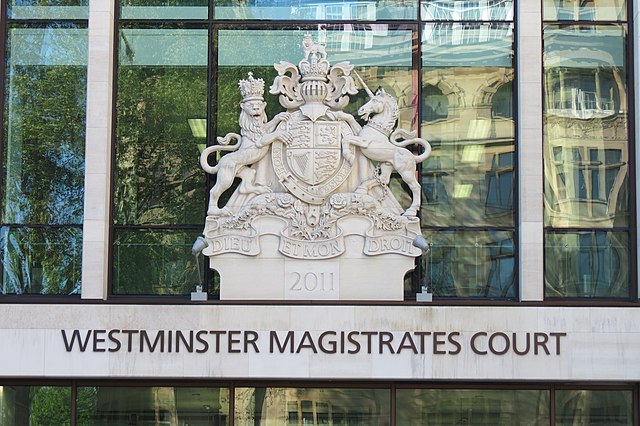An Israeli private investigator wanted by U.S. authorities for allegedly carrying out a hack-and-leak operation commissioned on behalf of ExxonMobil is fighting against his extradition to a Brooklyn, NY, detention center.
During a packed hearing last week at London’s Westminster Magistrates’ Court attended by DeSmog, lawyers for Amit Forlit used a legal strategy that one climate accountability advocate is referring to as “bizarre.”
The defense is arguing that Forlit, who is accused of being hired by the Washington D.C.-based public relations and lobbying firm DCI Group to illegally hack into the emails of environmental activists and others involved with climate change litigation against Exxon, shouldn’t be extradited on the grounds that the charges against him are politically motivated.
Last Wednesday was the first time Exxon and DCI were officially named in connection with the allegations – part of the defense’s claim that Forlit is “a form of collateral damage” in the legal pursuit of ExxonMobil.
Subscribe to our newsletter
Stay up to date with DeSmog news and alerts
To support his case, Forlit’s lawyers sought to present evidence from “expert” witness Scott Walter, president of a conservative U.S. think tank called the Capital Research Center (CRC) that for years publicly argued that the science of climate change is faulty and uncertain – including publishing a post last year disputing that “climate change” is “settled science.”
In his affidavit, Walter claimed that current efforts to hold ExxonMobil accountable in court for lying to the public about the dangers of climate change are at their core a political project connected to the U.S. Democratic Party.
Forlit is facing up to 45 years in prison for allegedly carrying out cyberattacks and hacking against groups and individuals involved with efforts to file lawsuits against ExxonMobil for misleading the public over the impact of burning fossil fuels on the earth’s climate, and spearheading public communications efforts to undermine the science.
Drawing on Walter’s affidavit, Forlit’s UK-based lawyer Rachel Scott stated in court, “we submit that these lawsuits are politically motivated.”
“It’s a bizarre strategy,” said Kert Davies, director of special investigations at the nonprofit Center of Climate Integrity, which has been involved with climate litigation. “Trying to claim that this guy is facing political persecution when, in fact, he was allegedly paid large sums of money to execute a massive hacking operation aimed at hundreds of employees at environmental nonprofit organizations and even those people’s spouses and kids.” Davies was one of the 128 individuals targeted by the hackers.
‘Opinion presented as fact’
On a grey January day, journalists packed into the London courtroom gallery where prosecutors representing the U.S. Department of Justice argued that Forlit should be extradited to New York. Upon his extradition, Forlit faces a federal indictment charging him “with three offences consisting of conspiracy to commit computer hacking, conspiracy to commit wire fraud, and wire fraud,” according to prosecution documents. “The maximum sentences are five, 20, and 20 years’ imprisonment, respectively.” The indictment has not been made public.
Wearing casual trousers and a blue shirt, Forlit watched from the side of the courtroom as lawyers argued about the political implications of his case. Acting on behalf of U.S. authorities, lawyer Adam Payter, with the firm 6KBW, took aim at the affidavit from CRC’s Walter, calling it “opinion presented as fact” and arguing that it was “inadmissible” as evidence.
Payter presented written material from the CRC’s website claiming that “environmentalist groups” and others are attempting to “undermine Americans’ freedoms.” The lawyer pointed out that CRC has on multiple occasions professed skepticism about human-caused climate change and advocated against solutions to the crisis by publishing a newsletter titled “Green Watch,” which outlines these positions. Payter then informed the court that, according to publicly available filings, Walter’s group has previously received funding from ExxonMobil – a conflict of interest Walter did not disclose in his affidavit.
In a blow to Forlit’s defense, District Judge John McGarva ruled that Walter’s affidavit could not be admitted as evidence.
Contrary to the defense’s claims that the charges against Forlit are politically motivated, Forlit “has been sought to be prosecuted for straight-forward criminal allegations that he orchestrated the hacking of persons for money,” the prosecution argued in a legal document submitted to the court.
“That Forlit, as the alleged orchestrator of a hacking scheme designed to politicise Climate Change Litigation,” should claim that he cannot be extradited and prosecuted because this Climate Change Litigation is politicised, “may be thought ironic,” stated Payter in a written submission to the court.
While the judge dismissed Walter’s statement, he agreed to consider supplementary reports and other material provided by Walter. This supplementary material included a report by Christopher Horner a former senior fellow with the Competitive Enterprise Institute (CEI), another group whose representatives have historically expressed climate skeptic viewpoints. According to publicly available data, CEI received at least $2.1 million in funding from ExxonMobil between 1997 and 2006. In 2018, when CEI published Horner’s report, five of CEI’s eleven board members had links to groups funded by present or historic players in the fossil fuel industry.
In court, Payter stated that he would like to add further context on CEI on the final day of the hearing scheduled next month.
Paid $16 million
The allegations against Forlit come from a Department of Justice investigation started in 2018. According to federal investigators, Forlit was the leader of several Israeli-based intelligence-gathering firms that specialized in “offensive and defensive cyber capabilities, including computer intrusions.”
In a court filing, Payter alleged that Forlit’s firms were paid $16 million between 2013 and 2018 by a Washington, D.C. lobbying firm, which, in turn, was acting on behalf of one of the world’s biggest oil companies, a company based in Irving, Texas, that wanted to undermine groups connected to climate litigation.
Scott, the lawyer representing Forlit, filed papers that named the names that Payter, the U.S.government’s lawyer, did not; she wrote that the hacking effort “is alleged to have been commissioned by DCI Group, a lobbying firm representing ExxonMobil…”
Some of the specific hacking initiatives were led by another Israeli private investigator named Aviram Azari, who oversaw hackers in India who in turn illegally accessed the electronic accounts of environmental campaigners. Azari was arrested in 2019, and sentenced to 80 months’ imprisonment after pleading guilty to computer hacking, identity theft, and wire fraud. (Azari’s sentence incorporated lengthy time in pre-sentence custody, and on January 3, he was released from prison and briefly transferred to the custody of U.S. Immigration and Customs Enforcement, after which he was sent to Israel.)
News: Israeli private investigator Aviram Azari, a key figure in the hack-for-hire industry, is being released from U.S. prison today and will be sent back to Israel. (Screenshot is from a Department of Justice email to one of Azari’s victims)
— Raphael Satter (@raphae.li) 2025-01-03T13:23:00.469Z
Prosecutors contend that DCI provided the hacked documents to Exxon and selected media outlets, including the Wall Street Journal. Exxon has used the allegedly stolen materials – which include a proposed legal strategy against the company – in its defense against ongoing climate litigation in Hawaii.
Both ExxonMobil and DCI have previously stated that they were not involved in the hacking operation.
Forlit was arrested in April 2024 under an Interpol Red Notice at London’s Heathrow Airport as he was attempting to board a flight to Israel. He was released on bail, forced to surrender his passport and make a security payment of £200,000 ($257,370).
The allegations in this case suggest oil and gas producers are willing to go to extreme lengths to discredit their environmental opponents, explained Robert Brulle, visiting research professor of environment and society at Brown University.
“The climate change countermovement is a sophisticated effort, involving multiple organizations engaging in a wide variety of strategies to obstruct climate mitigation efforts and to maintain business as usual,” he wrote in an email to DeSmog. “Climate litigation represents a threat to the business model of fossil fuel corporations, and so opposition to it is a core part of their efforts.”
The hearing will continue in early February.
Rebecca John is a research fellow at the Climate Investigations Center founded by Kert Davies, who is mentioned in this story.
Subscribe to our newsletter
Stay up to date with DeSmog news and alerts







